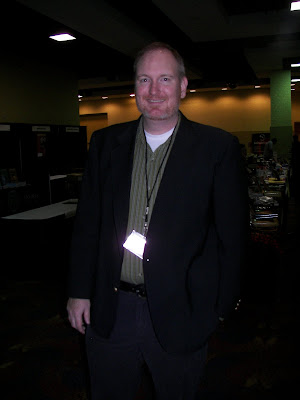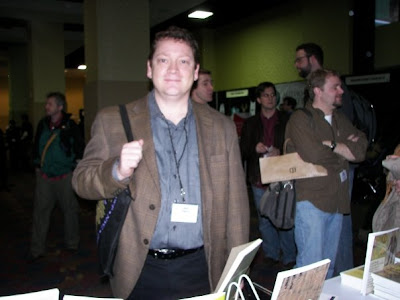 Some guys playing chess, withdrawn from their historical context
Some guys playing chess, withdrawn from their historical context A very interesting post from Reginald Shepherd as he works to define “post-avant,” which many poets are called, with a fascinating aftermath:
http://tiny.cc/kn3e6Here’s a paragraph from Shepherd’s brief essay:
*
"Post-avant" (as in, "post-avant-garde"—insider groups love shorthand) poets can be described as writers who, at their best, have imbibed the lessons of the modernists and their successors in what might be called the experimental or avant-garde stream of American poets, including the Objectivists (especially Oppen and Zukofsky), what have been called the New American Poetries (from Jack Spicer and Robert Duncan to John Ashbery and Frank O’Hara), particularly the Projectivist/Black Mountain School and the New York School(s), and the Language poets (including such poets and polemicists as Charles Bernstein and Ron Silliman), without feeling the need (as so many other poetic formations have) to pledge allegiance to a particular group identity (the poetry world is full of fence-building and turf wars) or a particular mode of proceeding artistically. As poet and editor Rebecca Wolff writes of her journal Fence, a home of the post-avant, such writing “intentionally blurs the distinction between 'difficulty' and 'accessibility,' preferring instead to address a continuum of utterance.” Though many of these poets have projects and even systems, there aren’t a lot of programs. There’s much prose writing and thinking about poetry, and many, many blogs (this is a very wired “generation”), but not many manifestoes.
*
What a nice paragraph, naming off many of my favorite poets, and what an interesting series of reactions his post has received. Go there and read it for yourself. It’ll take some time, though. When I printed it off it went on for something like 24 pages…
I will add this: there does seem to be a different sensibility, a different idea of what makes for a poem’s unity, in some poets writing now, versus most of the poetry previously written. That’s purely descriptive, not evaluative. Think what you want of the poetry itself, it is different.
Shepherd writes:
“Some of these writers have been called Elliptical poets by Steve Burt […] Some of them have been called ‘third way’ writers by Ron Silliman. Some of their work has been called ‘lyrical investigations’ by me . . . “
That “third way” bit was difficult for a lot of readers to deal with. Here’s what Silliman writes about the Third Way:
“…what I see as the promise of a Graham Foust is that I think he works from any perspective. If you’re a fan of Wendell Berry, you will like Foust. If you’re a fan of Billy Collins, you will like Foust. If you like C.D. Wright, or Charles Bernstein or Lynne Dreyer, you will like Graham Foust. In this sense, he is one of the younger poets who strikes me as having moved toward a post-militant American poetics, neither post-avant nor Quietist. Which in a way is what Third Way poets, from Bob Hass to Forrest Gander to Ann Lauterbach to Jorie Graham have been advocating for years now. But the Third Way has always struck me as predicated upon the existence of the other two. Younger poets today I think have more of an opportunity of learning from all worlds without having to sign up & pick sides. And that in turn will itself impact how writing gets done, going forward.”
So for Silliman, Third Way is not post-avant. Post-avant is a more deeply experimental mode, which is placed (I think?) in opposition to what he names (rather pejoratively, I feel) Quietist.
Is it all a shell game of lists of one’s favorite poets? Well, perhaps. But even if that is the case, it’s still valuable. As anthologies (realized, or just held in a list of names as Shepherd does here) are always interesting, and helpful.
Are the poets Reginald Shepherd lists at the end of his short essay emblematic of a 3rd way? A second and a half way? Do they owe more to Sylvia Plath or Gertrude Stein? Or Wallace Stevens? John Ashbery? The names for this group of poets changes, as well as the names of poets listed under the heading, but that doesn’t change the fact that something is up, and many of these poets keep getting named as the center of the something that is up. (Disclosure: my name appears on this list, and, well, I’ve never been named as near the center of anything, except in the formulation of “self-centered.”)
Oppen, Stevens, and Stein do seem to be a Holy Trinity of sorts hovering over many poets writing today, just as The New York School (again disparate and unified only in the “herd-of-cats” sense) seems to have worked out much of its territory, but with a different tone. And the poets on Shepherd’s list are, by and large, different from each other, though it can be said that they collectively don’t owe much if anything to Robert Frost . . .
Maybe attempting to describe such a group (which isn’t really a group so much as Shepherd [and others] noticing that some poets have a loose similarity of approach to composition) is doomed, but that doesn’t negate the fact that’s helpful and important to try. Descriptions are as necessary as they are problematic.
Why this should be so controversial is beyond me. OK, maybe I’m a bit disingenuous here. I see why it could be controversial, as any list of names, or name of a group or tendency, any act of naming, is an act of calling forth. We can’t talk about something without naming it, and naming it allows it, gives it, some amount of power. There are many people who don’t like these poets, who rather like the poetry that this group is said to swerve from, while robbing from. People with an investment in the history of how and why styles of poetry have emerged and have continued might not be very happy with a new group of poets who say, “hey, interesting compositional strategy, I think I’ll try that, mixed with a little of this,” when that this is a tendency from a rival poetic tendency. The question is this: does one need to take a prior poet’s background stance (political views, historical circumstance, etc) into consideration in order to take what they write as an influence? The answer, I believe, is “no.” That’s a big NO to some people.
There are many poets out there right now, scribbling away, and there are many circles of affiliation (political, aesthetic, friendship), though, of course, no poet worth much is wholly like another. To take, to research, and believe my way into what each poet thinks (or thought) would be a bewildering mess. Why a poet has done what that poet has done with words is much less interesting than what the poet has done with words. Suffice it to say, in Reginald Shepherd’s list of names, he’s listed pretty closely (with only a few poet’s I’d exclude, and a few I’d add) my favorite poets.
I’m mildly disappointed that we’ve stopped using the term “postmodern.” I thought it held, and still holds, quite a bit of descriptive power for the contemporary situation. Our present situation sits better with the definitions of the postmodern than did those of the 70s and 80s. There was a wonderful list of Modern and Postmodern tendencies in a book by Ihab Hassan I read once that I thought was great fun. Most of the poets in Shepherd’s group would fit well on that list.
One of the respondents to Shepherd’s essay, Henry Gould, writes, “Neither the current "post-avantists" nor their supposed "third-way" relatives have much in common anymore with that earlier era, which was marked by open cultural conflicts between Establishment and Resistance. Nowadays, supposedly radical culture-crit, poetry school, and organic vegetables are hip market commodities.”
This position makes it obvious to me that there is, indeed, a real and open cultural conflict here. For whatever that’s worth. The tone and stance against these poets and the act of attempting to name their poetic tendencies reveals the value in attempting to define this way of being in language these poets (or most of them—or some similar formulation of names) exemplify.
Or something like that.








































